Paderborn
![]()
The title of this article is ambiguous. For other meanings, see Paderborn (disambiguation).
The city of Paderborn (![]()
![]() [paːdɐbɔɐ̯n]) is a major city in the eastern part of the state of North Rhine-Westphalia with a population of over 150,000. It is located in the district of the same name and is its county seat, is a university town, a major centre and the centre of the Hochstift Paderborn region. The name refers to the sources of the Pader in today's city centre.
[paːdɐbɔɐ̯n]) is a major city in the eastern part of the state of North Rhine-Westphalia with a population of over 150,000. It is located in the district of the same name and is its county seat, is a university town, a major centre and the centre of the Hochstift Paderborn region. The name refers to the sources of the Pader in today's city centre.
Paderborn was first mentioned in a document in 777, when an imperial diet and a mission synod were held in Paderborn under Charlemagne. The first Westphalian university was founded in Paderborn in 1614, which was later transformed into an independent Faculty of Theology. A new university was founded in 1972. Since the ninth century the city has been the seat of a bishopric; this was elevated to archbishopric in 1930.
The city received its current boundaries through the incorporation of surrounding communities in the course of the territorial reform in North Rhine-Westphalia in 1974, whereby Paderborn became a major city.
Today Paderborn is ranked 56th among the largest cities in Germany.
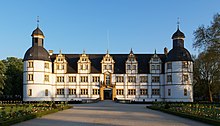
Neuhaus Castle, built in the Weser Renaissance style
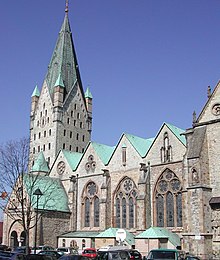
The south side of Paderborn Cathedral
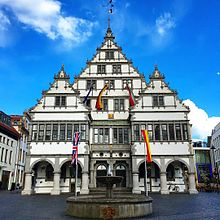
The Paderborn City Hall
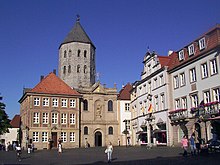
Paderborn market with Gaukirche
Religion
In Paderborn, the bishopric of the same name was founded in 799, which later developed into the Hochstift Paderborn as an ecclesiastical and at the same time secular territory within the Holy Roman Empire of the German Nation, which existed until secularisation in 1802/03.
The Reformation gained a foothold in the town from Lippstadt and the Landgraviate of Hesse from 1525, initially in the Minorite monastery. Bishop Erichs suppressed this in 1528 through countermeasures. In 1532 the reformatory efforts began again, which intensified from 1566. The cathedral chapter and eventually the majority of the population accepted the Evangelical Lutheran confession. Protestant preaching took place in the Market Church.
From 1580 the Jesuits initiated the re-Catholicization. Bishop Dietrich von Fürstenberg had the market church forcibly closed in 1596 and finally subjugated the city, which even Hessian support could not help, completely in 1604. After that there were no more Protestant services. Even the brief Protestant occupation under Christian of Brunswick-Wolfenbüttel in 1622 could not change this, and so Paderborn remained an almost exclusively Catholic city until 1802. Besides the cathedral there were several parish churches. After the abolition of the High Diocese of Paderborn, the diocese of Paderborn was reorganised at the beginning of the 19th century. As a result of the Prussian Concordat, it was elevated to the status of archbishopric in 1930. Today's Catholic parishes in the city all belong to the Paderborn deanery of the archdiocese.
In the 1990s the Hedwigskirche was built.
From 1802 onwards, a Protestant congregation was also formed. They first received the Abdinghofkirche, then the Alexiuskapelle, in 1817 the Busdorfkirche and in 1863 finally the Abdinghofkirche. While the Protestant Christians of the city initially belonged to the district synod of Bielefeld, Paderborn became the seat of its own district synod with a superintendent within the Protestant Church in Prussia or its Westphalian provincial church in 1840. From the Paderborn district synod developed the present-day Paderborn church district, to which 24 Protestant parishes within the Protestant Church of Westphalia belong today. The church district includes all the parishes of the districts of Höxter and Paderborn as well as the parish of Lügde from the district of Lippe. The three parishes on the Paderborn city area are Paderborn (with the districts of Abdinghof, Martin Luther, Mark, Matthew, John and Luke), Elsen and Schloß Neuhaus (with the churches in Schloß Neuhaus and in Sennelager). The districts of Benhausen, Marienloh and Neuenbeken belong to the neighbouring parish of Bad Lippspringe.
In addition to the Catholic and Protestant congregations in Paderborn, there are also various free churches, including an Evangelical Free Church congregation (Baptists), the "Free Christian Church" (Bund Freikirchlicher Pfingstgemeinden), a Free Evangelical congregation (FeG) and an Adventist congregation. The New Apostolic Church is also represented in Paderborn. Since 2009 there has been a free church in Paderborn belonging to the ICF Movement, which will be counted as part of the ICF Bielefeld from 2017.
Members of the Independent Evangelical Lutheran Church living in the Paderborn district regularly celebrate the Lutheran Mass as guests in the retreat chapel of the Motherhouse of the Sisters of Mercy of St. Vincent de Paul in Paderborn.
The house of worship of the Syrian Orthodox community is located on the Talle.
Until 2018, the services of the Russian Orthodox Church were celebrated in the Alexius Chapel at Paderborn Cathedral. Since 2018, they have been held in the former Roman Catholic Maximilian Kolbe Church in Bad Lippspringe, which was rededicated to the icon of the Holy Mother of God Feodorovskaya.
There are also six congregations of Jehovah's Witnesses, four of them in English, Italian, Russian and Turkish.
In Paderborn there are two Islamic communities and the Jewish community with its own synagogue. The Jewish religious community of Paderborn includes the districts of Paderborn, Soest and Höxter. There is a Jewish cemetery on Warburger Straße in front of the university campus.
Due to its affiliation with the former Hochstift, the majority of the population in Paderborn is traditionally Catholic. An indication for the distribution of religions can be the denominational affiliation of the pupils in Paderborn. According to this, in the school year 2006/2007 23.5 % of the pupils stated Protestant, 55.8 % Catholic and 6.9 % Islamic as their religious affiliation. 5.0 % stated another religious affiliation and 8.8 % no denomination.
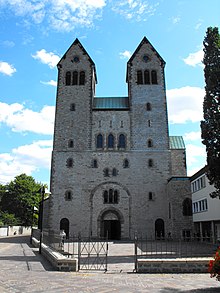
Abdinghofkirche, it goes back to a monastery foundation from the year 1015
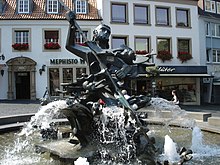
Neptune fountain by Josef Rikus in front of the cathedral
Personalities
→ Main article: List of personalities of the city of Paderborn
Among the most famous personalities born in Paderborn are the engraver and painter Heinrich Aldegrever (1502-1561), the singer and actress Sophie Schröder (1781-1868), the pharmacist and discoverer of morphine Friedrich Sertürner (1783-1841), the democratic politician Franz von Löher (1818-1892) and the resistance fighter Josef Wirmer (1901-1944). Also native Paderborners are the computer pioneer and entrepreneur Heinz Nixdorf (1925-1986), the journalist and presenter Dieter Thoma (1927-2017), the CDU politician and honorary citizen Wilhelm Lüke (* 1934), SPD politician and Member of the European Parliament Mechtild Rothe (* 1947), cabaret artist Rüdiger Hoffmann (* 1964), Tagesschau anchorwoman Judith Rakers (* 1976), TV presenter Stefan Gödde (* 1975) and footballer Alexander Nübel (* 1996).
Honorary citizens include the Reich President Paul von Hindenburg (1933), the Archbishop of Paderborn Lorenz Cardinal Jaeger (1956), the President of the Bundestag and former Federal Minister Rainer Barzel (1984) and the Archbishop of Paderborn Johannes Joachim Cardinal Degenhardt (1991).
Important personalities who lived and worked in Paderborn for a longer period of time were or are, among others, the Jesuit priest Friedrich Spee von Langenfeld (1591-1635, author of the Cautio Criminalis and most prominent opponent of torture and witch trials), who worked here between 1623 and 1633 (student of the Jesuit University, then professor of moral philosophy), the confessor of Emperor Karl VI. Vitus Georg Tönnemann (1659-1740), the composer of the late Romantic period Engelbert Humperdinck (1854-1921), the Chancellor of the Weimar Republic Wilhelm Cuno (1876-1933), the Bishop of Essen Franz Cardinal Hengsbach (1910-1991), the church critic and professor Eugen Drewermann (* 1940), the CDU politician Friedhelm Ost (* 1942) and the SPD politician Ute Berg (* 1953).
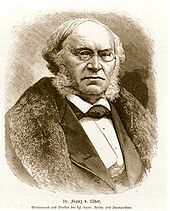
Franz von Löher
Search within the encyclopedia